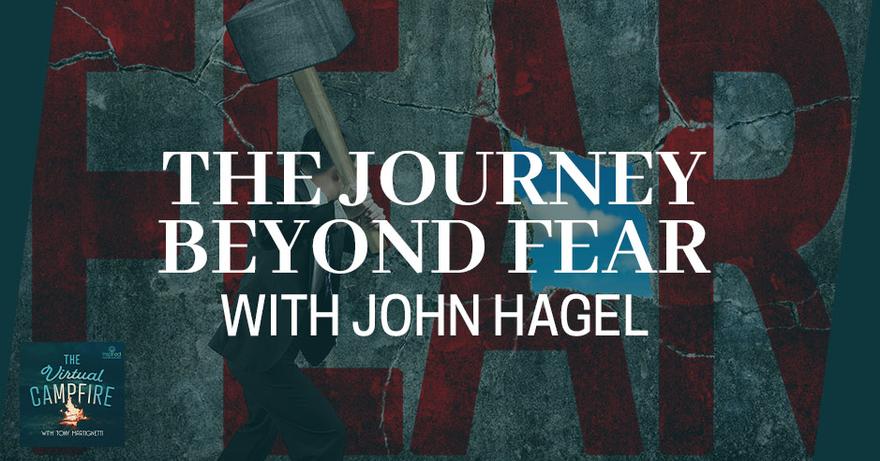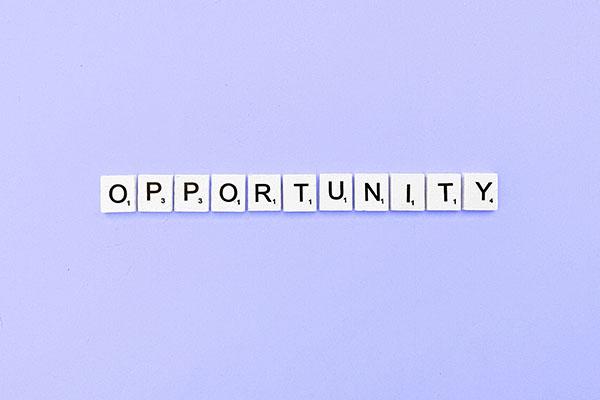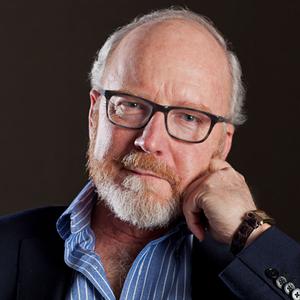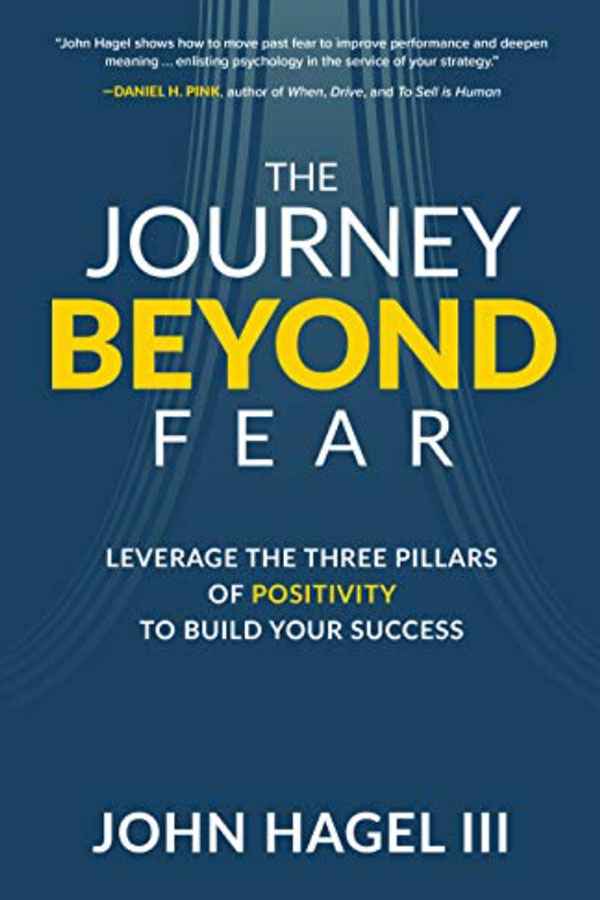The Journey Beyond Fear With John Hagel

Fear is an obstacle we face both in life and in business. The key to success is not eliminating it but rather moving forward despite it. Here to share his wisdom on the topics is John Hagel. John is the founder of Beyond Our Edge, where he helps companies anticipate—not fear—the future to achieve greater impact. In today’s episode, we hone in on insights from his book, The Journey Beyond Fear, on how to overcome and achieve success even as we encounter and experience fear in our business. Join his chat with host Tony Martignetti and learn key mindset strategies to help you and your business in this journey. Plus, hear about John’s stint in Silicone Valley and how he’s been helping companies anticipate and prepare for change throughout his career.
---
Listen to the podcast here
The Journey Beyond Fear With John Hagel
It is my honor to introduce you to my guest, John Hagel. He has more than 40 years of experience as a management consultant, author, speaker and entrepreneur. After retiring as a partner from Deloitte, McGraw Hill published his book, The Journey Beyond Fear, which addressed the psychology of change. He is developing a series of programs to help people navigate through change at many levels.
He has founded a new company Beyond Our Edge that works with companies and people who are seeking to anticipate the future and achieve much greater impact, focusing on business transformation. While at Deloitte, he was the founder and chairman of the Silicon Valley-based Deloitte Center for The Edge, focusing on identifying emerging business opportunities that are not yet on the CEO's agenda.
Before joining Deloitte, he was an independent consultant and writer. Prior to that, he was a principal at McKinsey & Company and a leader of their Strategy Practice. He's a Founder of their eCommerce practice. He has served as Senior Vice President of Strategy at Atari. Those who are relatively young probably don't even remember Atari. As the founder of two Silicon Valley startups, he has published eight books drawing on his research and experience as a management consultant and entrepreneur. He has lived in Silicon Valley for over 42 years. I am so thrilled to welcome you to the show, John.
Thank you very much.
What a bio. There is so much that you've done. I'm looking forward to digging into the journey that got you to this place where you've accomplished so much. I love your book. It was a powerful book that is a recommended reading for everyone these days. Thank you for writing that. As we do on the show, we often take people through their journey of looking at your story through what's called flashpoints in your journey that have ignited your gifts into the world.
What we're going to do is as we enter this conversation, you're going to take us through your journey through these flashpoints. Along the way, we'll stop and see what's showing up and what themes emerge. John, I'm thrilled to have you on the show. I've been a huge fan. I'm honored and thrilled to share you with the audience. With that, John, you can start by sharing the moments that have revealed your gifts into the world. What are the flashpoints or the moments along your journey that you feel made you into who you are now?
There are so flashpoints. As a child, I had flashpoints virtually every year because I was living in a different country every year as a child. It was a real catalyst for me in terms of exposing me to new environments and cultures. On one level, it’s very exciting. On another level, it’s also very fear-inducing because I show up at school and I don't know anyone in the school at all. Worst of all, I know that if I make any friends during the year, at the end of the year, I'm going to have to leave them and never see them again. That helped me to learn how to quickly adapt to new situations and environments and make the most of them. I'm grateful for that experience.
What was the reason for the constant moving? Was there a military family or is there something happening to your father or mother's job?
My father worked for a large oil company and he loved international work. Every year, he would ask for a new assignment and most years he would get it.
You did a lot of living around in different places and countries, and got exposed to a lot of people. I can understand that is chaotic but at the same time, it’s a great learning experience. When did you start to settle down or did you ever settle down?
It took a while. I came back to the US for college and graduate school. Another flashpoint for me was back in 1980. At the time, I was living in Boston, working with Boston Consulting Group or BCG. A lot of my friends have been to business school. They have gotten a business degree and went into business. They were intrigued with what computers could do for them. Remember, this was 1980. It was quite a while ago, but they were very frustrated because every time they went to a computer company, they get inundated with techno-babble. They leave them even more confused than when they began.
I saw an opportunity to create a business that would serve as a translator and help to communicate what these computers could do to business people. In 1980, I decided to quit my job at BCG. I moved to Silicon Valley and start a computer company. The interesting thing about that is I had never used a computer in my life, much less had any technical background or training. Many of my friends said I was absolutely insane and that I needed therapy, but I resisted the advice. I packed up and moved to Silicon Valley, and I haven't looked back.
What do you think it is about you that made you uniquely good at this?
It's a theme that has played out throughout my life or my career. It's this notion of anticipating emerging opportunities and helping people to address them. It's not just looking ahead and seeing an opportunity. It's how I address it. That was what I was doing with this startup. I was anticipating that computers were going to be more and more central to business. I needed to help them see how they could use them and get value from them.
That's an interesting thing that you bring this up because there's a lot of value in being able to see what's around the corner and seeing what's next for us. Although there are a lot of amazing individuals in the world who work in new technologies, it's also about applying it and getting people to get comfortable with that on different parts of the spectrum between businesses. Different parts of society have to get used to it.
Commitment is a by-product but the focus is excitement. Are you really excited about the opportunity and willing to do whatever it takes to get to that?
One of the things that pulled me to Silicon Valley and have kept me here for over 40 years is the optimism in the culture here. People are excited about the future. They see huge opportunities that they can address and want to address. There are challenges and problems, but the focus is always on the opportunity. How can we address those opportunities? That has become a key theme in my life and helped me to overcome a lot of fear. There was fear when I was moving from East Coast to the West Coast to a place I had never lived in and doing a business that I had never done. It was that notion of the opportunity that was exciting to help me overcome the fear of doing something completely different.
Tell me what happens next in your journey as you move to the West Coast and take on this new endeavor. You started a new company in essence.
I was the founder. I brought together 2 or 3 friends of mine and we found somebody with technology expertise. That was the founding team.
You have this founding team and business is flowing in. Of course, it’s so easy to start a company. Tell me about the early challenges.
There are infinite challenges. It was the early days and we were focused on desktop computers. Our view was the opportunity in business was to bring computers to the desktop. There were some emerging computers, but we had to configure our own computers and write the software. We were targeting a specific business segment. We wanted it to be a turnkey system. You put it on your desk and it will provide you with all the functionality you need in a business.
Our target was physicians in private practice. We had about ten physicians doing the back-office stuff, insurance claim, processing, billing, and those kinds of functions. It was challenging getting that software written and then getting the early adopters to provide some reference cases so we weren't just dismissed as techies who have no idea what to do. There were a lot of challenges getting started there.
When you think about those early days and now and how far we've come, you can't go to a doctor's appointment now without having a computer at the ready. It's part of every appointment. Now, we're in telehealth, which is even more prevalent. People don't even question that at this point. They've come a long way for sure. It's interesting. Tell me more about what happens next. You start this company, but it wasn't the only company you started. What made you decide to move past that first initial jump into entrepreneurialism?

It was a lesson learned. We attracted a lot of attention because we rapidly became the largest company in this particular segment of physicians and the medical world. We were approached by the largest clinical laboratory company in the US. They made an offer to acquire us that we couldn't refuse. The lesson learned was they had no experience in the computer industry and they ended up making choices and decisions that limited the potential of the business. The founding team became very frustrated and we all ended up leaving to try something else.
I got intrigued by Atari. At the time, it was growing at an extraordinary rate. While its primary business was the video game business, it also had a home computer business. I saw that as a huge potential for them to develop and become the leading home computer provider. I was recruited by the owner of Atari. At the time, it was owned by Warner Communications. They brought me in as Head of the Strategy to help them see the opportunity.
We're not seeing Atari computers anymore. Tell us what happened with that.
Again, it was a lesson learned that this huge success of Atari in the video game business had led it to become completely focused on video games. Computers were a distraction. We have a computer and it was selling well, but the real opportunity in business is video games. Because they're very complacent, they couldn't see increasing competitors coming into the video game business. They ended up not doing well. I ended up being very frustrated because I saw the opportunity, but couldn't persuade them to pursue it.
The reason why I asked this is because time and time again, we see a possible future and try to reach for that. If there's no strong commitment to go after it, and put effort and dollars towards it, what happens is you run the risk of failing or not being able to make things happen. There has to be a good commitment behind it.
It's more than commitment. In my sense and the way I talk about it, one of the key things that I've learned in my career was in business strategy, I was taught to believe that strategy is everything. Over the years, I have come to believe that it's less about strategy and more about psychology. If we don't understand the emotions that are shaping our choices and actions, the best strategy is going to sit on a shelf somewhere. What I look for is not just a commitment. It's a byproduct but the focus is excitement. Are you excited about the opportunity and willing to do whatever it takes to get to that opportunity? It's exciting not because you have the discipline or are forced to, it's because you're excited and you can't stop. That's what I look for.
I love that insight. That's powerful. That energy can drive you. I'm translating excitement into positive energy because we could have negative energy too, but that energy is what drives you.
Success can breed failure.
I think it's the balance. The other emotion that is increasingly prevalent is the emotion of fear. I felt a lot of fear when I was going off to do this start-up in Silicon Valley on so many levels, but I was so excited about the opportunity that I made the move. It was something I couldn't resist.
I would love to have you talk more about fear because you've written a book about it. My opinion on fear is that we need it. We need fear to some extent. If we don't have any fear, then it doesn't give us that energy towards like, “I got to leap into that place of fear.” You follow that fear a little bit.
It's a complicated situation. What I see in fear is that it's prevalent emotion and I've spent a lot of time studying it. Fear has a number of consequences. One is it shrinks our time horizons. If we're afraid, we just focus on today. We can't afford to be distracted by anything in the future. It's too scary so we just focus on today. We also become much more risk-averse, "It's so scary, I can't take any risk. I need to hold onto what I have and not let go." There's also an erosion of trust, "If I'm afraid, how can I trust anybody else? They seem like nice people, but they're going to leave me hanging. I have to do it all myself." It becomes very isolated. You do it yourself and not rely on anyone else. While it's understandable, it's also very limiting as an emotion.
Fear can be limiting and constricting. I can narrow your focus and keep you limited. If you see it as a signal that the thing I fear the most may be the thing I need to explore and see beyond it, that's what may be where the future is heading. It's beyond that fear.
Part of my work now is around helping people to make the transition. I believe that when I talk about fear, I'm talking about fear of the future. When you look into the future, do you see it primarily as threatening or as an opportunity? More and more of us are seeing the future as very threatening. It has got all the bad things. Part of my work with people is helping them to shift their focus to the big opportunities in the future that are exciting that could motivate them to want to make a difference that's meaningful, and to overcome their fear and start to focus on that opportunity versus the threats. There's balance. It's recognizing that opportunity isn't going to happen by itself. There are a lot of barriers and challenges along the way, but the opportunity is worth pursuing.
I want to bring it back into your story or personal journey. How did you move from the work you were doing into what you're doing now? What were some of the things that shifted you from being in more strategy, focused on working with Atari, and then moving into the business that you have now? What was the impetus for that?
It was a journey. There was no sudden leap. I spent sixteen years at McKinsey & Company in their Strategy Practice. One of the key things I did there was I founded their eCommerce practice. This was back in the early 1990s when most of the partners had no idea what the internet was much less what the business opportunity was.

It was my drive to anticipate opportunities and help people address them. I saw the role of fear, not just in the clients, but even in the partners of McKinsey. They didn't want to engage in a conversation about this because it was so new and unclear what to do. It became clear to me that I had to recognize the fear, and one of the ways I addressed it was by writing books. I wrote two books while I was at McKinsey on the emerging opportunity of the internet and eCommerce. What it did was it got executives who had read the book to call McKinsey and say, "I need help on this. This is interesting. This is exciting."
It helped the partners to overcome their fear because clients were asking for this, it wasn't that they had to somehow convince the client that this was worth pursuing. That was an interesting lesson for me. It’s what I called the power of pull. Rather than pushing and trying to force the partners to engage with clients, it has got the clients to pull the partners in.
The other big shift for me or a place of flashpoint was the opportunity to create a research center at Deloitte where the entire charter was to address unseen opportunities that were not on the CEO's agenda. I was the one who defined it and got the acceptance before I joined. I persuade them through research to address the opportunity. It was dealing with fear. The challenge was it's out in the future and hasn't been done before, “Why would I want to do that? That's too scary. That's too risky. I'll keep doing what I'm doing."
What's intriguing about this is that you're working with some highly-acclaimed amazing thought leadership organizations on strategy. I come to the realization that even though they're on the cutting edge, they also have their own fears of where to go, what to do next, and how to navigate the emerging worlds. If they're having challenges, considering the fact that they're the people on the forefront, then companies who are going it alone or trying to figure out what to do are having even more of a challenge. Would you agree?
One of the big challenges that I've come to see in life is that success can breed failure. From an emotional viewpoint, success has one of two consequences. One is we either become very complacent, "We've achieved huge progress. Let's keep doing what we're doing and stay focused on what we've done," or it breeds fear, “Because I've accomplished so much, I can't afford to lose that. I don't want to lose that. I got to squeeze harder and keep doing what I'm doing," versus looking ahead and seeing much bigger opportunities that could be addressed.
It's like the artist who says, "I'm known for doing X, so I should continue to do X because that's what people like. If I go out of that zone of X, maybe it's an impressionistic painting. Will people still respect me?” The reality is you should go outside of that zone because that's exactly where your growth edge is.
We've done a lot of research on the forces that are reshaping our global economy and society. The pace of change is accelerating. One of my key messages to everybody I talk to is that if we continue doing what we've always done to be successful, that's the key to failure. It's to recognize the changes, embrace the changes and the opportunities that are being created by the changes, and be excited about it to pursue them.
The pace of change is accelerating. If we just continue doing what we've always done to be successful, that's the key to failure.
Before we move to the next part of the interview, are there any flashpoints that you think we've missed or you would like to share beyond what we've shared already?
There are so many flashpoints. It's a journey. I'm at a flashpoint now in that I retired from my work leading the Research Center at Deloitte to write this new book, The Journey Beyond Fear. My goal at this point is to create a new center that will focus on helping people to make the journey beyond fear. It's focusing explicitly and directly on the emotions rather than viewing the emotions as something that needs to be addressed as part of something else. Let's tackle that directly and what can we do to help each other to move beyond the fear and cultivate the emotions and the excitement that will help us to have more impact that's meaningful to us. That's my next stage.
This is exactly what we need in terms of someone to embrace that as being the way forward. Emotions are the leading indicator and we need to be able to be mindful of understanding what they are telling us and where we should go.
One of the challenges I'm encountering is that people say, "Wait a minute, I'm not hearing many people express fear." My response is, "We live in cultures where expressing fear is a sign of weakness. You don't want to be afraid. You're weakling." What do we do? We either hide the emotion or we find other emotions that we can express that are more acceptable. I believe a lot of the anger that we're experiencing around the world now, if you probe underneath, what's driving that anger is fear. Anger is a strong and good emotion. That's when we can express ourselves. Recognizing and acknowledging the fear is the first step, and then finding ways to move in spite of it.
I have said this to myself when I was uninformed. I’m like, "I'm not afraid of anything. There's nothing that worries me," and then I'm like, "What am I thinking? That is so wrong," because there are so many things that I'm afraid of. When I say I'm fearless, it's because I'll jump out of an airplane or I'll climb a mountain. I'll do all these adventurous types of things, but that's not things that I fear. The fears that I have are very different. My fears are more around acceptance, belonging, and those types of stuff.
I'm not in any way suggesting that we eliminate fear. Fear is a natural emotion and there are reasons to be afraid. One of my favorite examples in this context is I've spent a lot of time studying big wave surfers and extreme sports. If you talk to a big wave surfer who's paddling out to ride the next big wave, they're afraid.
They know that people have not only fallen off their surfboards. People have died riding those waves. They're afraid, but they're still paddling out because they're so excited about the opportunity to do something that hasn't been done before. It's what I call the passion of the explorer that is the key to overcoming fear. It's not eliminating it, but moving forward in spite of it.

I have to ask because there are so many things that you've learned about yourself in this journey to where you are now, and I'm excited about the future of where you're headed. Tell me what you've learned about yourself. It’s 2 or 3 things that as you reflect back, you say, "What about my journey have I learned about myself?"
There are many things. It has been a journey. I grew up in a childhood of fear. We didn't talk a lot about moving around. I had a very dysfunctional family. In my book, I write about the experience. My mother had huge rage issues. My father became an alcoholic. There were a lot of issues that created fear in my soul.
One of the things I was taught was that my needs didn't matter. It was all about serving the needs of other people. I created what I call a personal narrative, which was the opportunity that I had was to address the needs of other people. Find out what they needed and help them with that. It wasn't about my needs at all. Over time, I've come to realize that my needs do matter. I have real needs and it has to do with looking ahead and anticipating the future. That's what excites me, and then helping people to address that future, but the need is for me to be able to anticipate things.
It has been a journey for me to realize that. The other piece, and I write about this in more detail in the book, is that as I look back on my trajectory or journey, each period of my life, there was something that excited me, but they were quite different. At least when I look back, I said, "I'm constantly moving from one thing to another."
One of the things I forced myself to do at one point in the process of growth and reflection was to say, "Is there anything that connects all these things that provide the thing that is exciting me across all these different areas of activity?" I realized, "Yes, there is." There was a constant thread there and that was my passion. That was what was exciting me. Being able to finally acknowledge and articulate that passion helped me to be much more effective in pursuing it.
I love what you shared because it's also something that a lot of people will relate to. It’s the fact that that's how you find the thing that is meaningful to you. Your purpose comes from looking back and seeing the things that have shown up along your journey and then seeing that's the way to move forward.
I certainly recognize the value of looking back and studying the past. To me, the key to moving forward and to shifting from fear to excitement is finding that opportunity in the future. What is it in the future that is exciting for you? It’s committing to pursue that versus doing what you've been doing.
It's not eliminating fear, but it's moving forward in spite of it.
Like me, you're probably into time travel. You have to spend some time thinking about putting yourself in different periods, but the future is a big part of that. You have to think, "What is me in the future? What is us in the future? How do we relate to that? How do you put ourselves in the past?” I think about how we relate to ourselves in different periods of time. It's important to think in that way. I have one last question for you. What are 1, 2 or 3 books that have had an impact on you and why?
I can't name any of the eight books that I've written. They've all had an impact on me. There are so many. I'm an avid reader. I've got thousands of books in my library downstairs. If I had to single out 1 or 2, one of them is a book called Mindset by Carol Dweck. She's a professor at Stanford and has developed an interesting distinction between a fixed mindset and a growth mindset.
I've come to believe that critical to our progress is embracing the growth mindset. Another book that's related, but from a different angle is Finite and Infinite Games by James Carse. He makes an interesting distinction between games that are finite, where it's more of a win-lose situation, either you win or I win, versus infinite games which have infinite potential, and where we can all win by playing that game. That's the key to embracing the notion that by coming together, we can create much more value than staying isolated and competing with each other.
First of all, both books are fantastic. The second book is interesting because Simon Sinek has taken this concept and updated it to an extent in his new book, Infinite Games. like Carse's view on this. When I read that book first, it was powerful. Simon's take is powerful too but I liked the first take, which was nice. I can't thank you enough for coming to the show. I could talk about these concepts all day long. Your story is powerful. Thank you so much for coming on the show and sharing all of that you shared.
I appreciate the opportunity.
Before you go, I want to make sure that people know where they can reach out and find out more about you.
I welcome contact with people who are intrigued and interested in these ideas. I have a website called JohnHagel.com where I do blog posts. You can sign up and get on a mailing list. I'm also very active on social media. I post regularly on LinkedIn, Twitter and Facebook. You can connect with me on any of those sites as well. I look forward to connecting.
I love your posts on Twitter and LinkedIn. They're always intriguing because I'm a big fan of sciences, the arts and all that. The stuff you posts are always interesting. Thank you. Keep up the good work.
Thank you very much.
Thank you again and thanks to the readers for coming on the journey. It's truly a pleasure and you're leaving with so many great insights. That's a wrap.
Important Links
- JohnHagel.com
- The Journey Beyond Fear
- Beyond Our Edge
- Mindset
- Finite and Infinite Games
- Infinite Games
- LinkedIn – John Hagel
- Twitter – John Hagel
- Facebook – John Hagel
About John Hagel

With our global economy still in the early stages of a ‘Big Shift,’ we are living in a world of exponentially expanding opportunity. I help companies and individuals look ahead to the future, to meet that opportunity, and I also inspire them to look within to understand what really motivates them and others.
I was drawn to Silicon Valley in 1980 because of the massive sense of optimism and people with the drive to change the world. Over years of advising companies and other institutions as a strategist, I came to realize that long-term success is less about strategy and more about psychology – namely, understanding the emotions that drive us.
My goal is to help leaders engage around fundamental issues, find more effective ways of integrating personal development, and drive the evolution of their environments to achieve their full potential. I work with companies from all over the world, to widen the field of vision to anticipate opportunities that can be leveraged, build excitement, and cultivate emotions that will help people achieve more impact and more meaning.
A widely published and quoted thought leader, I have been featured in major business publications like The Economist, Fortune, Forbes, Business Week, Financial Times and Wall Street Journal as well as the New York Times, NBC, and BBC. I have been a Keynote Speaker and at World Economic Forum, Microsoft CEO Summit, World Technology Summit, Wharton, Stanford, Harvard Business School, TED, Singularity University, and more.
I’m excited to lead the transformation for individuals and institutions that hunger for impact, are seeking to creating new knowledge together through action, and want to leverage these insights to deliver more value to all stakeholders.
Love the show? Subscribe, rate, review, and share! https://www.inspiredpurposecoach.com/virtualcampfire



0 comments
Leave a comment
Please log in or register to post a comment